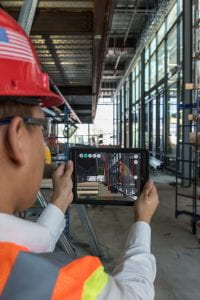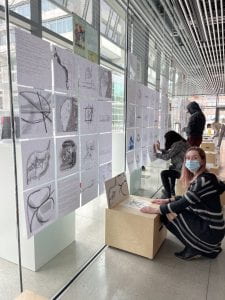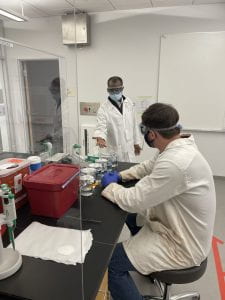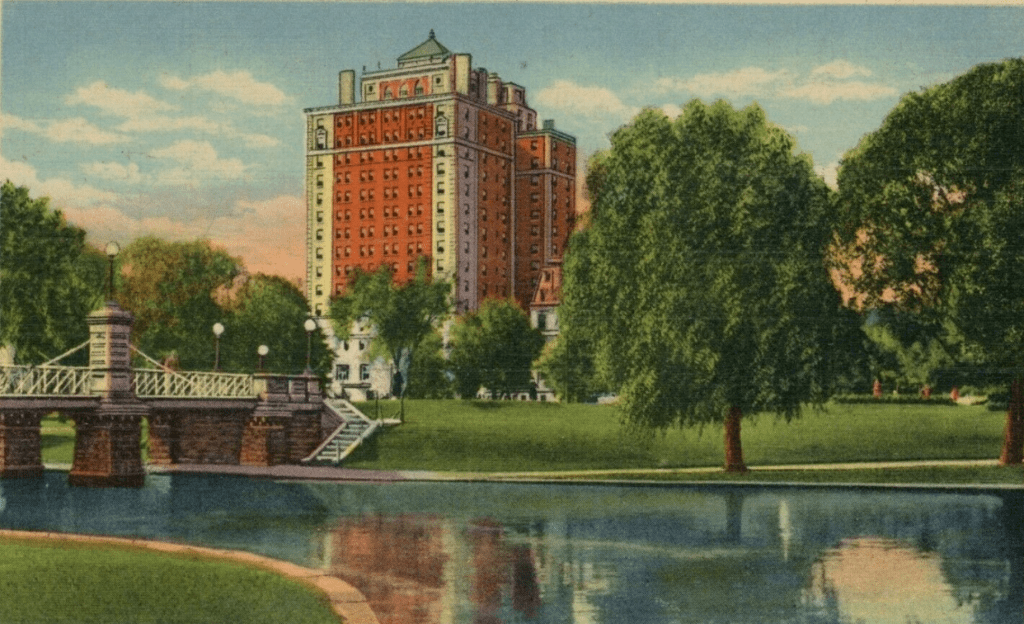The Boston Ritz-Carlton Hotel, as seen in this vintage postcard image from the 1920s
By Greg Abazorius
The hotel at the corner of Arlington and Newbury streets in Boston—overlooking the waterways and verdant landscape of the Public Garden—has a rich history. Opening in 1927 as the first Ritz-Carlton in the country, it has long presented an element of luxury to tourists venturing off the Freedom Trail and passersby clasping shopping bags collected from the chic boutiques freckling adjacent Newbury Street.
In a town filled with historic buildings, this hotel has become a mainstay, an opulent high-rise in one of Boston’s most trafficked areas. Sharon Jozokos was aware of the building’s importance when new owners took it over and rechristened it The Newbury Boston, contracting her company, Columbia, to completely renovate the building.
As Columbia’s vice president of healthcare, Jozokos, AET ’92, CMC ’93, oversaw work on the Oligo Synthesis and Ballroom project at MassBiologics and the Lahey Hospital & Medical Center COVID-19 testing lab in 2020. She was also privy to The Newbury Boston project undertaken by her colleagues, which called for a gut renovation, including infrastructure upgrades to bring all life-safety systems up to code, new construction of a glass enclosure for a rooftop restaurant, and significant interior expansion to create larger rooms and open spaces.
Work began in late 2019. And then the COVID-19 pandemic struck.
The team had to manage numerous protocol requirements, prioritizing worker safety and well-being while overseeing as many as 150 tradespeople on site daily.
The current economy has also slowed supply chains, making it more difficult to obtain certain materials, impacting projects across the country.
“The planning and execution of a project like this requires an enormous amount of collaboration and planning to minimize surprises that can affect time and cost,” shared the Columbia team, “while maintaining the highest level of quality a historical building such as this deserves.”

Photo courtesy Consigli Construction
Roughly 450 miles away, Matthew Consigli was also refurbishing a landmark—the Smithsonian National Air and Space Museum in Washington, D.C.—while contending with the parameters of the pandemic. Consigli, president of Consigli Construction, and his CEO brother, Anthony Consigli, have long hired Wentworth co-ops and graduates, some of whom were working on this project.
“When we work with Wentworth graduates,” Matthew Consigli notes, “we get highly intelligent people that are not only skilled in the latest technologies but are focused with a strong work ethic.” That skill set proved helpful in 2020—including with the recent completion of a new athletic center for Colby College—when his teams had to be extra creative.
Consigli notes that his company and others are using 3-D visualization and digital project management tools, which have helped enhance and streamline the communication process. Design and construction teams can now work together in real time virtually.
Columbia and other organizations that often hire Wentworth students and grads have also embraced new technology, creating video and other imagery to share the current conditions of construction sites with remote owners, designers and consultants. Management of COVID-19 related site risks, changing protocols and implementation has likewise become a priority to ensure the safety of all personnel and avoid jobsite shutdowns and workforce impacts.
“The utilization of technology to collaborate virtually has dramatically changed how we communicate and has allowed for efficiencies in our work’s day-to-day management,” says Jozokos, a Wentworth University Adviser.
Wentworth Provost Ian Lapp agrees. “Certainly, the pandemic has made us feel closed off from our community,” he says, “but it has also provided an opportunity to get up to speed on certain technologies and ways of conducting both education and business that were all coming along eventually, no matter what.”
A hybrid model of taking some classes at home while completing labs and engaging in applied learning on a physical campus intrigued Lapp nearly a decade ago. He thought long about changing technologies of the time and the ways that people in education and industry were able to communicate with one another several thousand miles apart.

Jenna Acord BSA ’21, MArch ’22 during a class held in the Center for Engineering, Innovation and Sciences (Photo by Ian Lapp)
“The future of work is global. We need to ensure that our students learn how to collaborate digitally, time shift and employ more flexibility,” Lapp says. “Imagine an international student who now has a better opportunity to engage with a class in Boston. We suddenly have a much better sense of how to do that.”
Adds Consigli: “We are looking for our employees to understand the importance of being strong communicators. In a technology-driven world, job seekers should know that what will set them apart is their ability to use and leverage technology as a tool while embracing the importance of basic human connection and building relationships beyond a virtual world.”
The pandemic has tested in real time the strengths and limitations of what can be achieved. Wentworth plans to bring most students back to campus in the fall but leave open the option of distance learning while looking at how to utilize a hybrid style for future courses.
“We learned a lot over the last year. Let’s reflect on it,” says Lapp. “Lessons of the Wentworth experience during the pandemic have further affirmed for me that the future of higher education—and those finding success—will be dependent on figuring out what’s best learned on a campus and what works well remotely.”
Wentworth’s Facilities department was busy in 2020, overhauling HVAC systems, adding and renovating studio spaces, de-densifying labs and classrooms, and increasing disinfecting and cleaning measures. Similar changes have been taking place within industry.
“Design is changing both architecturally and mechanically to provide more open space and separation for customers, patients and students,” says Jozokos, adding that many mechanical systems are being upgraded, and that extra space is being created between different areas to minimize potential cross-contamination.

Assistant Professor and Provost Initiatives Coordinator for Inclusive Excellence David Simpson (background) speaks with a student in one of Wentworth’s labs
At the same time, Jozokos notes that designers must give thought to the acute isolation—causing increased anxiety, depression and loneliness—many people have felt during the pandemic.
“Shared spaces, both private and public, will need to continue to consider the human need for community even as safeguards are put in place to help prevent future health emergencies,” she says.
Consigli believes that physical workplaces will have to be portable. Instead of arriving every day to a desk, workers will meet in person for collaboration and personal connections, but there will be increased flexibility in how and when people are conducting other jobs.
“The pandemic accelerated a change in how we work and what a typical workday will look like now. There will be more flexibility in how and when people are working,” he says. “But human connection is not something that can be replaced, and inherently people will continue to thrive in environments where they have the flexibility to get the most out of their workday.”
Columbia ultimately finished work on The Newbury Boston, which was scheduled to once again welcome guests in spring 2021. And Consigli is continuing work on the Air and Space Museum, with work scheduled to be completed in June 2024.
Both Consigli and Columbia have gone into overdrive on their communications efforts, knowing that exhaustive planning will continue to win the day, particularly in the wake of pandemic-related changes. And on a personal level, Jozokos feels those graduating into the workforce should be able to seek out information and guidance when needed. Like Consigli, she believes that strong communications skills are critical to a successful career.
“High performers seem to have the ability to self-motivate and stay connected with team members during this extended remote work environment,” she says. “These skills will be of significant importance for younger staff to advance their careers.”


